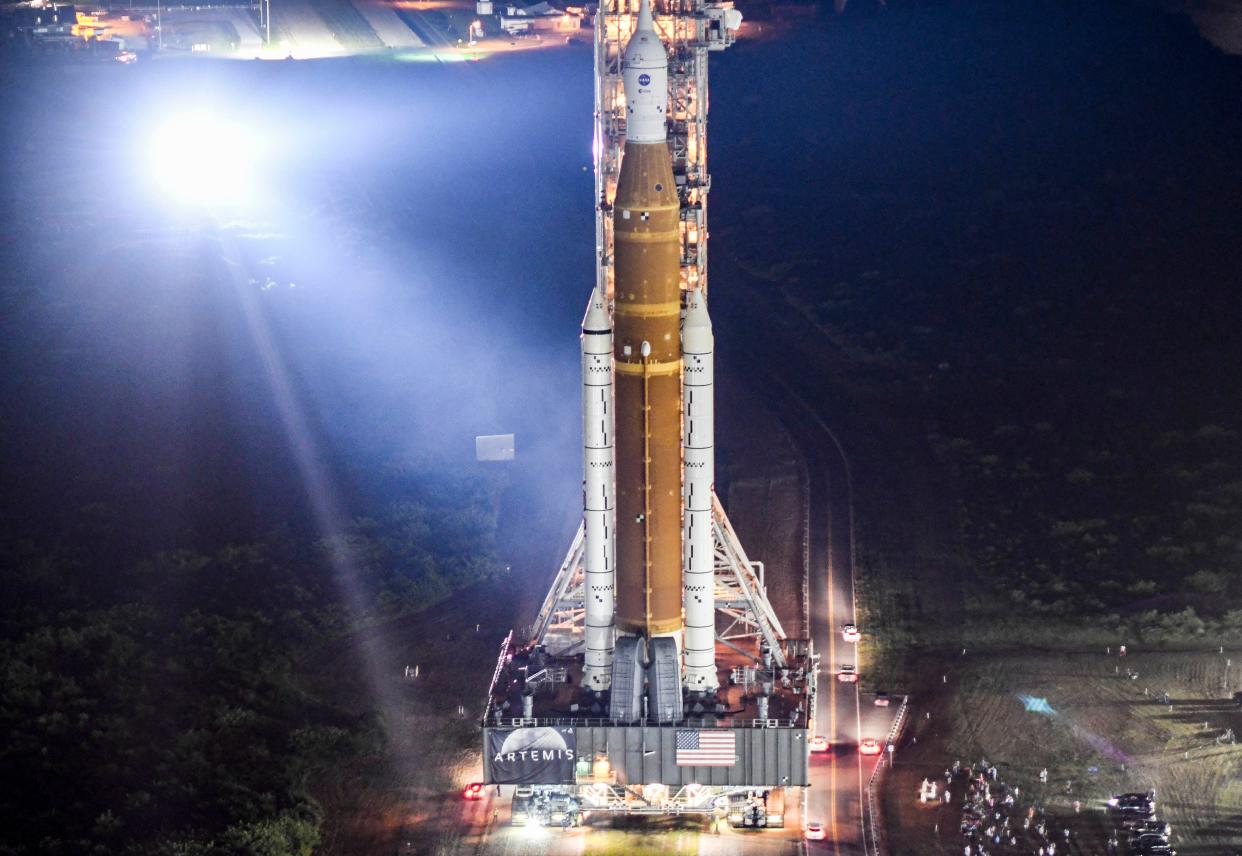NASA's SLS rocket teeters on relevance even before its maiden flight

Oops! It's been a crazy week. I accidentally sent out last week's newsletter again. I do apologize. But at least you know there is a real human with flaws behind the words you receive each week. Here's what you should have received this morning.
Dear FLORIDA TODAY Subscriber,
A massive rocket is waiting for its maiden flight from the Space Coast, but with its massive size comes a massive cost and this week we're pondering how long NASA will be able to afford to use the Space Launch System.
Before we dive too far into today's topic, I just want to take a moment to thank you for subscribing to FLORIDA TODAY and supporting journalists like space reporter Jamie Groh who this week brought you the story of the out-of-this-world cost to launch the next generation moon rocket.
The Space Launch System or SLS has been in development for decades. It's built using leftover designs from the Space Shuttle and Constellation project. In fact, the center fuel tank and side rocket boosters offer the nostalgia of the space shuttle system.
Now, couple that with archaic supplier contracting systems relied on to construct the rocket and you've got massive budget-blowing cost overruns.
NASA now finds itself with a rocket that will cost up to $4.1 billion per launch. When adjusted for inflation, that's nearly four times what the space agency paid to launch the Saturn V during the Apollo missions.
That's a huge difference.
But unlike the 1960s space race, we now have private space companies like SpaceX or United Launch Alliance which could likely launch astronauts to the moon faster and significantly cheaper than what NASA is going to spend on the SLS and the Artemis missions. That is making some experts question how long the rocket will remain relevant to achieving the goal of sending humans to the moon and beyond.
Your subscription helped Jamie bring this story into the light. It took extensive reporting and interviews to understand how NASA got here.
I wanted to get a better understanding of what it was like to cover this story and what surprised her in the reporting.
Question: What was the most surprising thing you learned while writing this story?
Jamie: The most surprising thing I learned while writing this story is just how long and arduous a path NASA’s Space Launch System rocket has endured. It’s been in planning, then development, production, and testing since 2011.
I think it was most surprising because it’s not exactly new technology, techniques, or purpose. It’s informed by and even closely resembles Saturn V, Shuttle, and Constellation plans. I would’ve assumed going that route would have taken less time than designing, manufacturing, and building some kind of brand new deep space launch and transportation system.
Having dug through the history of the SLS rocket though, it’s extremely evident why and how it became so costly.
Q: is there anything that didn't make the story that you think readers should know?
Jamie: I think readers should know that the SLS is only a small component of the larger Artemis picture. Artemis is a huge, multi-national effort to get humanity back to the moon to stay. There are so many international partners and private companies that are invested in the success of the overall Artemis program.
And while whether or not SLS proves to be the real back bone of the program is still to be determined, I think the Artemis program is going to be around for a long time to come.
Q: There's a huge gap between SLS launches on Artemis missions. Is there speculation that private space will surpass Artemis in returning to the moon thereby making the program irrelevant?
Jamie: I wouldn’t say there’s speculation that the private space industry will surpass NASA’s efforts to get to the moon.
I would say that there is collaboration and willingness to utilize the private industry in more functional and beneficial ways than has been seen previously and that will perhaps continue to be a driving force for a long while.
Jamie is still relatively new to the space team and to FLORIDA TODAY. But having spent a lot of time talking with her following our post-pandemic return to the office, I can tell you she's a good fit. She's smart. Very smart.
As a former teacher, she's got a knack for taking complicated scientific or budgetary stories and breaking them down. If you've spent anytime with folks at NASA, you know there's a lot of "alphabet soup" jargon to cut through, i.e., "SLS will roll from the KSC VAB to 39B."
So of course my final question: What's your favorite part about being a space reporter?
Jamie: My favorite part about being a space reporter is the opportunity to continuously learn more about the aerospace industry and community and share my enthusiasm for it with our readers.
Space has been my lead topic of interest and conversation for decades and it’s incredible to be able to turn that into a career while simultaneously connecting our audience with information they may otherwise not have an opportunity to engage with.
You can read Jamie's subscriber exclusive story on the SLS cost here and I've placed it down below with a few other stories your subscription helped us provide this week.
You can reach Jamie at jgroh@floridatoday.com or on Twitter at @AlteredJamie
And as always, you can reach me at rlanders@floridatoday.com. Or you can find me on Twitter, Instagram, TikTok or YouTube (just click the name, the internet will do the rest).
That's it for this week. Again, thank you for supporting local journalism and journalists like Jamie and me.
Sr. Multimedia Editor
FLORIDA TODAY
This article originally appeared on Florida Today: NASA's SLS rocket teeters on relevance even before its maiden flight

